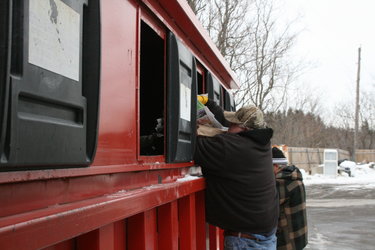Westerlo to trash companies: Comply with law or face consequences
WESTERLO — The two commercial trash haulers that pick up some Westerlo residents’ garbage and bring it to the town transfer station are at risk of losing their permits following stubborn non-compliance with town policies, which Supervisor Matt Kryzak said is burdening taxpayers.
The topic was introduced at the town board’s Sept. 21 meeting, where Kryzak explained that, after the town started making residents get transfer-station permits — essentially proof that a resident has paid the $25 fee for use of the transfer station each year — it began receiving applications from out-of-towners who use a commercial service. Permits are required of both commercial entities and the individuals who use them.
“So essentially what that is is we have garbage coming into the town from folks who aren’t residents, being hauled here by commercial haulers that have already been told to not bring trash to non-residents in the town,” Kryzak said.
But even though some clients of these companies are making attempts to follow town policy and cover their share of expenses by applying for a residential permit, Kryzak and Town Clerk Karla Weaver said that they’ve each made requests of the trash companies for clients’ lists, which have so far gone unanswered.
“I personally delivered a stack of transfer-station permits to one of the commercial haulers, put it in his mailbox and told him, ‘Hey, do the right thing. We’ve asked you a few times to get your clients [in compliance],’” Kryzak said.
He added that the haulers pay $400 a year for commercial permits, which only covers “six or so tons of garbage per year,” even though the haulers bring in far more than that.
“Essentially, you’re getting hit in your checkbook for disposal of the trash,” Kryzak told the audience. One hauler does not actually have a commercial permit for 2021.
The Enterprise could not reach the companies involved. Kryzak said during the meeting that he didn’t want to “mention names.” It is not clear how many residents would be affected by loss of commercial services.
“Currently the Town Attorney is reviewing the transfer station law and we are investigating the situation,” Town Clerk Karla Weaver told The Enterprise last week. “We are not able to comment at this time.”
Because this was the first time the topic was introduced and it involves navigating town law, the board did not take any action at the Sept. 21 meeting, and instead asked town attorney George McHugh to evaluate possible maneuvers. However, the board seems prepared to terminate service with the haulers if the law allows it.
“I think all of this is spelled out in the Solid Waste Management Code,” said Councilman Joseph Boone, “so I would say, Mr. McHugh, if you can check that and get back to Mr. Kryzak on what the board can and can’t do … but I think it spells out pretty clearly what the town board has the power and authority to do in these cases.”
The town’s waste-management code is indeed clear about what commercial haulers are expected to do and how the town is authorized to respond.
“A Commercial Collection and Disposal Permit shall only be valid for Commercial Waste or Household Waste generated within the Town,” the law states. “Each applicant for a Commercial Collection and Disposal Permit is required to submit an application form to the Town Clerk and provide proof of identity, vehicle registration, insurance, customers’ names and addresses, Customer Town Permit Tag numbers, other permits or approvals required by any other governmental authority, and any other information required in the form application.”
Elsewhere, the law lays out the town’s ability to impose civil penalties on violators, with the first violation triggering a $250 per day penalty, and subsequent violations triggering a $500 per day penalty. The law also states that permits become void when a business stops operating in the town or a resident moves elsewhere.
In 2014, the town chose not to renew the license of a commercial hauler that was bringing in out-of-town trash.
Kryzak said that, if the town were to stop working with those commercial haulers, any clients who have already paid for a transfer station permit would still be able to bring their own trash to the dump and “get their money’s worth.”
Weaver, who, as town clerk, does not have a vote but is the point-person for transfer station permits and has been the one sending letters to the haulers, expressed sympathy for those who would have to start carrying their trash on their own or find other means, particularly those who are elderly. However, she said that she feels the town has an obligation to follow its own law.
“If we don’t enforce the law,” Boone said, “it’s not worth the paper it’s written on.”



